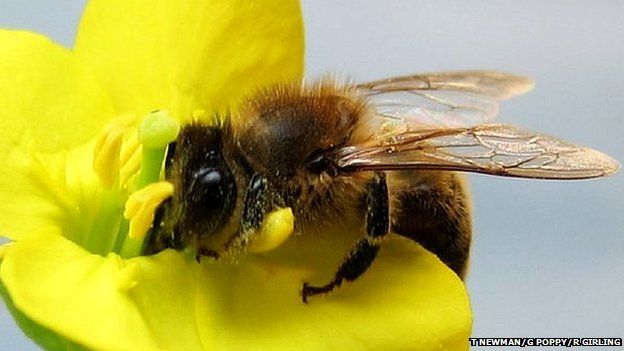Bees' foraging for flowers 'hampered by diesel exhaust'
- Published

Honeybees' ability to find flowers could be hampered by a chemical in diesel exhaust, say scientists.
Tests showed that exhaust degraded some floral scent chemicals the bees "home in on" when they are foraging.
The study, published in Scientific Reports, also revealed that a specific group of chemicals found in diesel exhaust, known as NOx, diminished the insects' response to floral scents.
They say the results are evidence that air quality should be improved.
"We got into this, because we were aware of the impacts of airborne pollutants on human health, so it didn't seem so wild that there may be impacts that extended beyond human health," said University of Southampton neuroscientist Dr Tracey Newman, who was involved in the work.
To drill down to the chemical effects of pollution on the pollinators, the researchers made a mixture of the volatile, or smelly, chemicals that make up the scent of oilseed rape.
They then used a diesel-powered generator to create a mixture of air and exhaust that closely matched levels of exhaust found on a busy road, and mixed this lab-made air pollution with the floral scent mix.
"We saw that there was loss of two of the components [of the floral odour mixture]," Dr Newman said.
The two odour chemicals that were "lost" had chemically reacted with a component of the diesel exhaust, mono-nitrogen oxide, known as NOx.
Having worked out how the pollution affected the chemistry of floral scents, the team set out to discover if the bees were affected by this change.
"Bees need to decipher the chemical messages they're getting [from flowers] to be able to home in on the flowers they know will give the best yield [of nectar]," said Dr Newman.
The pollinators, she said, learned to recognise the scents of nectar-rich flowers and this enabled them to forage more efficiently.
Sniff test
The team carried out a test that involved teaching bees to associate the smell of a particular chemical with being given a drop of sugary liquid.
Bees respond to the taste of the sugar by sticking out their tongues - just as they do when drinking nectar from a flower. So after a few trials where the scent of the odour is followed closely by a sweet drop of liquid, the bees stick out their tongues as soon as they detect the scent.
This miniature taste test, known as the proboscis extension reflex test, can be used to work out if bees are able to detect the scent of a flower
"Having trained a bunch of bees, we then tested to see if they would respond in the same way to the mixture that was depleted by exposure to NOx [the reactive chemical in diesel exhaust]," said Dr Newman.
When these odour chemicals were degraded by NOx, the bees were much less responsive to their smell and would not stick out their tongues.
Biologist and lead researcher Dr Guy Poppy added that the airborne pollution appeared to be interfering with "the complex relationship" that had evolved between plants and animals.
"Flowers have evolved to produce chemical mixtures that attract pollinators," he told BBC News.
Dr Newman added that the study highlighted the need to reduce pollution and improve air quality, in order to protect pollinating insects as well as improve human health.
The value to food production of so-called "pollination services" is estimated to be hundreds of millions of pounds per year in the UK alone.
Prof James Nieh, who studies honeybee health and behaviour at the University of California San Diego, said that the research posed a "largely unexplored question".
"Most research on such contaminants has focused on pesticides," he told BBC News.
"But bees are subject to a much wider variety of pollutants and contaminants. The influence and potential synergy of these pollutants with pesticides should be studied."
- Published2 August 2013
- Published2 August 2013
- Published18 July 2013